

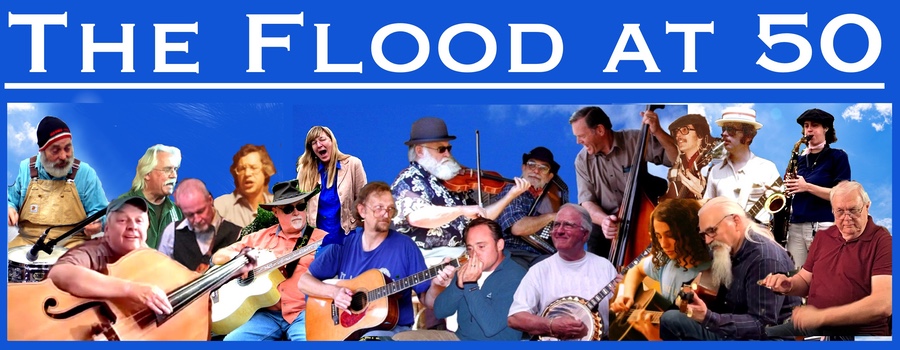
The Flood traces its roots to a New Year’s Eve party in 1973, when David Peyton and Charlie Bowen first started working out some tunes together. Pamela and Charlie had been friends with Dave and Susie Peyton for years, since they all worked together at the Huntington newspapers and they all were interested in folk music. About that same time, Pamela and Charlie started hosting semi-annual, weekend-long music parties at their house in 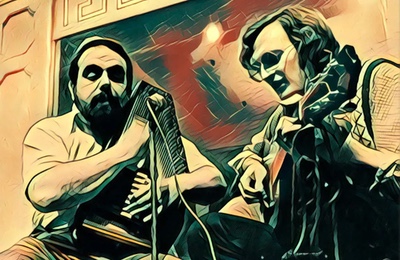 the south side of Huntington that their friends began calling “The Bowen Bash.” From jam sessions at those happy, hippy parties (which continued into the early 1980s), the band took shape.
the south side of Huntington that their friends began calling “The Bowen Bash.” From jam sessions at those happy, hippy parties (which continued into the early 1980s), the band took shape.
 Then in the spring of 1975, while playing at one of the earliest editions of Huntington’s annual Dogwood Arts and Crafts Festival, Dave and Charlie met fiddler Joe Dobbs. In those days, Joe — who had been a professional fiddler back in his home in east Texas — had pretty much stopped playing, but they encouraged him to get back into music. The three of them — David, Joe and Charlie — formed the core of the band for the next four decades.
Then in the spring of 1975, while playing at one of the earliest editions of Huntington’s annual Dogwood Arts and Crafts Festival, Dave and Charlie met fiddler Joe Dobbs. In those days, Joe — who had been a professional fiddler back in his home in east Texas — had pretty much stopped playing, but they encouraged him to get back into music. The three of them — David, Joe and Charlie — formed the core of the band for the next four decades.
 Something that sets The Flood apart from other bands is that it's never focused solely one type of music. (It was Joe’s son Dale who first called them “West Virginia’s most eclectic string band.”) From the beginning, they have drawn from very diverse sources. While Peyton was greatly interested in the traditional tunes from great West Virginian players like Aunt Jennie Wilson and Molly O’Day, Charlie grew up loving everything from mainstream jazz and blues to Bob Dylan. One of their earliest bandmates, Roger Samples, had an abiding love for the Beatles, James Taylor and the Eagles, but also Jimmie Rodgers and the Carter Family. Meanwhile, Joe Dobbs grew up listening to the Texas swing of Bob Wills, but also the cajun tunes of his native Louisiana. From their earliest days to today, a Flood gathering — whether a stage show, a jam session or a rehearsal — is a mixed bag. A traditional fiddle tune is likely to be followed by a jazz standard like “Moonglow” or “Ain’t Misbehavin’,” leading to a cover of a tune by John Prine or Tom Paxton, then off to a Bessie Smith blues or some rollicking Charlie Poole number, and then perhaps up with a crazy, happy hokum tune we’ve taken from the Memphis Jug Band. Yeah, while we’ve always admired musicians who devote their careers to a single genre, we’ve obviously don’t have the attention span.
Something that sets The Flood apart from other bands is that it's never focused solely one type of music. (It was Joe’s son Dale who first called them “West Virginia’s most eclectic string band.”) From the beginning, they have drawn from very diverse sources. While Peyton was greatly interested in the traditional tunes from great West Virginian players like Aunt Jennie Wilson and Molly O’Day, Charlie grew up loving everything from mainstream jazz and blues to Bob Dylan. One of their earliest bandmates, Roger Samples, had an abiding love for the Beatles, James Taylor and the Eagles, but also Jimmie Rodgers and the Carter Family. Meanwhile, Joe Dobbs grew up listening to the Texas swing of Bob Wills, but also the cajun tunes of his native Louisiana. From their earliest days to today, a Flood gathering — whether a stage show, a jam session or a rehearsal — is a mixed bag. A traditional fiddle tune is likely to be followed by a jazz standard like “Moonglow” or “Ain’t Misbehavin’,” leading to a cover of a tune by John Prine or Tom Paxton, then off to a Bessie Smith blues or some rollicking Charlie Poole number, and then perhaps up with a crazy, happy hokum tune we’ve taken from the Memphis Jug Band. Yeah, while we’ve always admired musicians who devote their careers to a single genre, we’ve obviously don’t have the attention span.
Wherever the band has played — whether on in a cozy college classroom or on a stage before hundreds or even thousands of folks — it has always tried to spread the message that such multifariousness should be celebrated as the essence of American music. And we’ve had some wonderfully diverse venues in which to pitch their particular gospel.
For instance, for several years before the Covid-19 shutdown, The Flood was the house band for a wonderful monthly music variety show called “Route 60 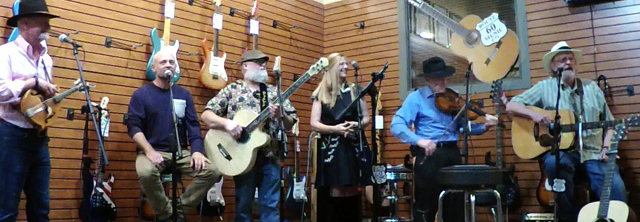 Saturday Night” (hosted at Route 60 Music Co. in Barboursville), which mainly showcased local singer-songwriters. On the other end of the spectrum, the band for many years also played a fun annual gig called “a jug band breakfast” at a gathering of traditional jazz fans and players called the Coon-Sanders Nighthawks Fan Reunion Bash. they played from the riverfront (we once were featured with the Huntington Symphony Orchestra, but they also regularly did shows on the legendary Delta Queen steamboat) to the mountaintops, playing at places like Snowshoe Mountain Resort and Cranberry Glades. We’ve played theaters from ArtPlace in Lexington to the Paramount in Ashland to the cultural center in Charleston to Tamarack in Beckley. We’ve played in coffeehouses from Huntington to Wheeling, but we’ve also played at the governor’s mansion
Saturday Night” (hosted at Route 60 Music Co. in Barboursville), which mainly showcased local singer-songwriters. On the other end of the spectrum, the band for many years also played a fun annual gig called “a jug band breakfast” at a gathering of traditional jazz fans and players called the Coon-Sanders Nighthawks Fan Reunion Bash. they played from the riverfront (we once were featured with the Huntington Symphony Orchestra, but they also regularly did shows on the legendary Delta Queen steamboat) to the mountaintops, playing at places like Snowshoe Mountain Resort and Cranberry Glades. We’ve played theaters from ArtPlace in Lexington to the Paramount in Ashland to the cultural center in Charleston to Tamarack in Beckley. We’ve played in coffeehouses from Huntington to Wheeling, but we’ve also played at the governor’s mansion 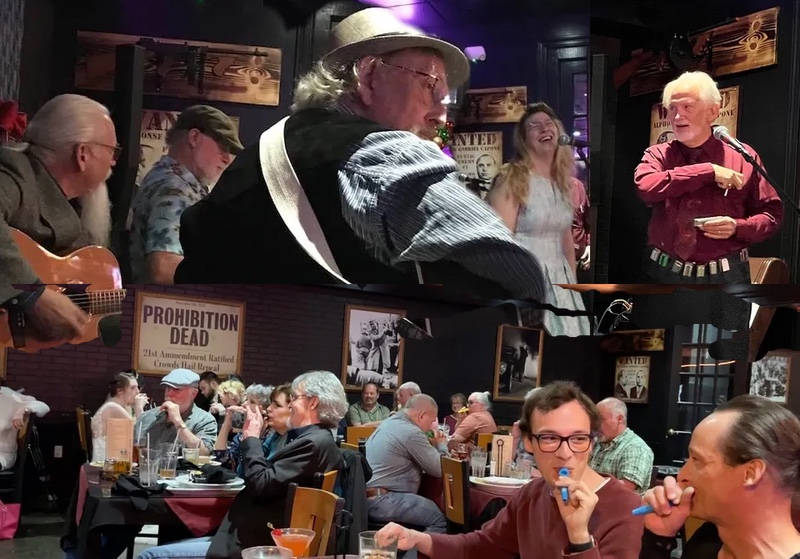 in Charleston. In fact, former Gov. Bob Wise used to clog dance to their tunes when they were on stage near him. And we’ve even jammed with fiddler Robert C. Byrd, when he wasn’t busy with his day job in the U.S. Senate.
in Charleston. In fact, former Gov. Bob Wise used to clog dance to their tunes when they were on stage near him. And we’ve even jammed with fiddler Robert C. Byrd, when he wasn’t busy with his day job in the U.S. Senate.
Lately the group has performed monthly at a wonderful Ashland, Ky., venue called Sal's Speakeasy. (Boy, this band has been waiting for a place like that for years!)
Early on, Peyton and Bowen used to talk about the possibility of giving up their own day jobs at the newspaper and trying to make a go of it as professional musicians. It was Joe Dobbs (who had worked as a professional fiddler in his youth) who set themn straight on this notion. He said, “Trust me. If you want to keep loving the music, don’t do it for a living.” In other words, do you want music to be a job or a joy? His formula obviously worked. At shows today, just as at those decades ago, they regularly hear people in the audience talking about how much fun they seem to be having on stage. “I can never tell,” one fan told me, “who’s having the most fun — the audience or the band?”
The band lost Joe in 2015, Roger in 2016 and David last year — but the zest of that original recipe is still evident in The Flood of the 2020s. New members come to the band with the same diverse interests as the founders, and we’re still devoted to the eclecticism that was the group’s founding principal. Nowadays, The Flood is a quintet.
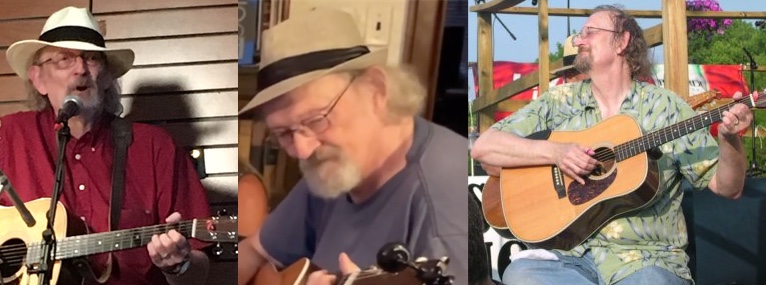
So Charlie is the last of the original Floodsters still standing, on vocals and rhythm guitar (and occasional banjo). Born in West Virginia and reared in Kentucky before returning to his homeland in the early '70s, Charlie is a freelance writer, author of books and magazine columns. In recent years, he's also been teaching journalism at Marshall University.
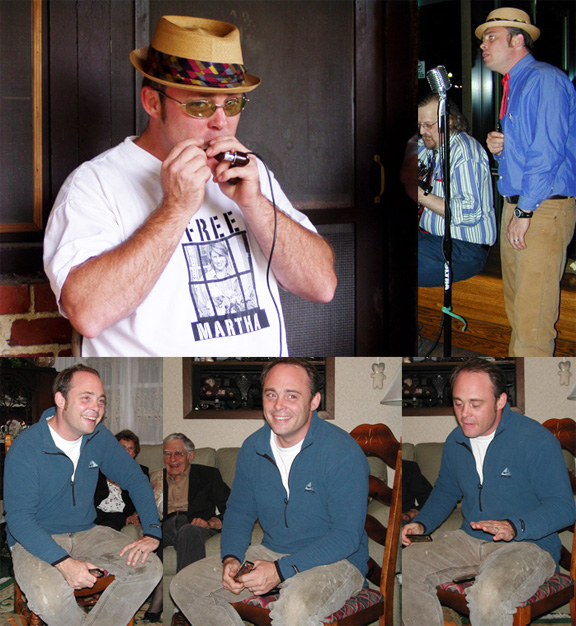
Sam came on board in 2001 as their harmonica player. A commercial property manager by day, Sam is a Huntington native who has travelled extensively around the world. He has tales of everywhere from Brazil to New Zealand. Sam has a degree in art, was a champion wrestler in high school and these days helps out with coaching wrestling and also teaching in the yoga studio operated by his wife, Joan.
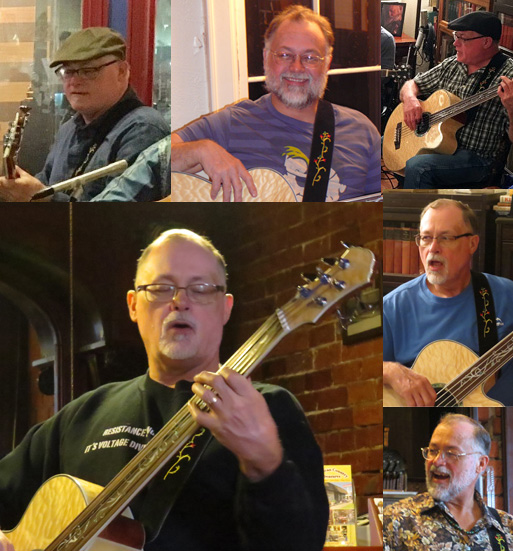
Randy, who joined in 2012 on bass and vocals, was born in Paintsville and raised in Southern Ohio, Randy had a love of music from an early age. Having seen his uncle and cousin play guitar and sing he knew that is want he wanted to do and that started him down the musical road 45 years ago. Randy plays bass guitar, acoustic guitar and also sings lead or harmony vocals. Before joining The Flood, Randy played locally with the Sheldon Road group.
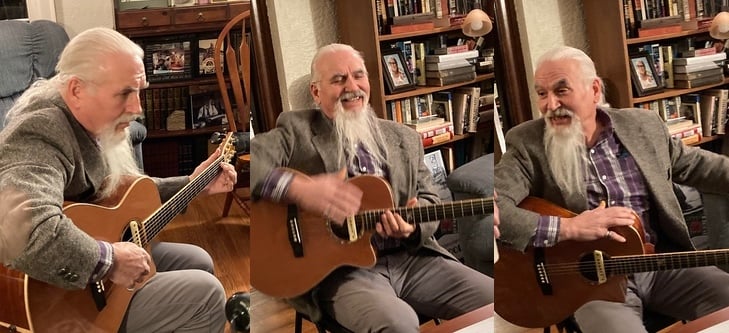
Joining up in 2022, Danny was born and raised in southern Ohio, Dan was not quite 13 in the spring of '72 when his dad bought a guitar from a nephew for $3, brought it home and, with a big grin, handed it to his son. "I hadn' asked for or shown any interest in learning to play guitar," Danny recalls. "Mom taught me D, G, and A7 to accompany the 'Great Speckled Bird.' It was a beginning." Pretty much self-taught, "I had a brother-in-law who's a pretty good player; he showed me me some classic rock licks and could play Chet Atkins style. I would watch anyone that could play a guitar." Danny played in several bands over the years as he travel around the country as a field service engineer. After he rerired, he moved back to the Tri-State Area in 2019 and married his 7th grade girlfriend.
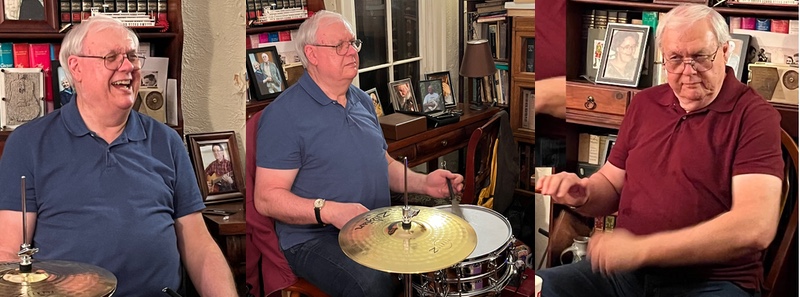
Jack joined this year after jamming with the group on assorted percussion instruments — from bongos and spoons to cool brushes on snare and hi-hat. Jack is a veteran educator. A retired high school history teacher, he now teaches as a adjunct professor. He also was recently re-elected as a long-time member of the South Point, Ohio, school board. As Bowen recently noted, “Jack is one of the few functioning musicians still around who was actually at those parties where The Flood was born in the 1970s.”
The band has faithfully continued its free weekly podcasts; since 2008, podcast subscribers have received a new tune each week, usually something taken right from a recent rehearsal. And the podcasts have formed the basis for one of the group's most ambitious project to date has been Radio Floodango, the free music streaming series, built on continuous randomly generated playlist of tunes automatically selected from some 700 released in the podcasts over the past dozen years or so.